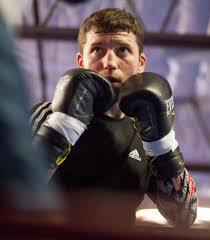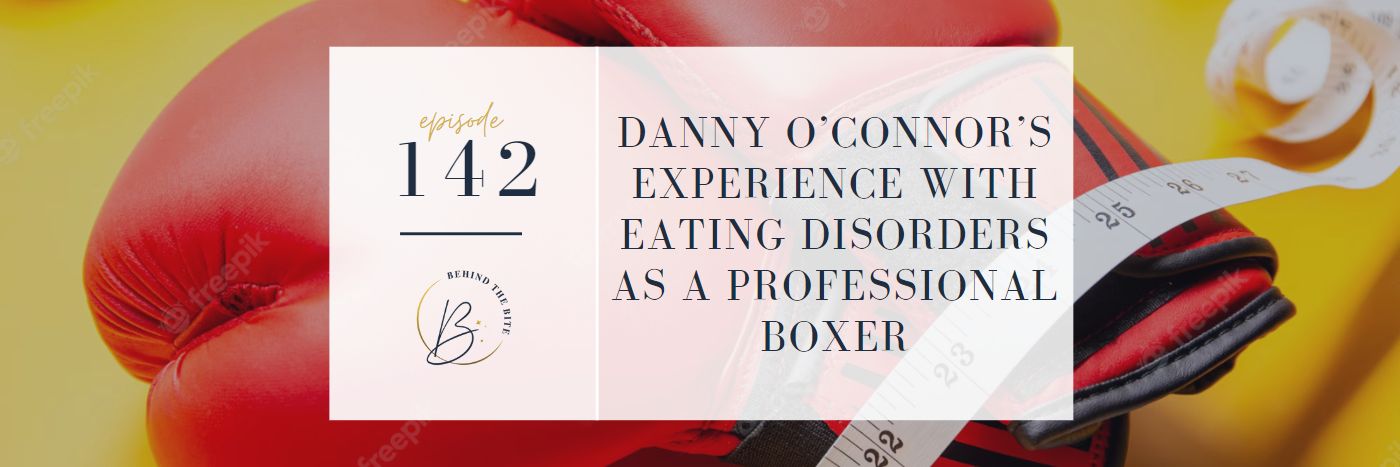MEET DANNY O'CONNOR

Danny O’Connor is a professional boxer with a 31-3 (12 knockouts) professional record. He is the former WBC international silver super lightweight champion, New England welterweight champion, and was in line to fight for the WBC world super lightweight title in 2018.
Born and raised in Framingham, Massachusetts, O’Connor began boxing as a teenager and was the National Golden Gloves and U.S. Nationals champion, earning himself an alternate spot on the 2008 U.S. Olympic team.
Turning pro in the fall of 2008, O’Connor became one of the most popular boxers on the New England scene, and when he went national, his star continued to rise, ultimately earning him a world title shot. Currently, O’Connor is in the midst of a boxing comeback, and he also works as a Paramedic in Colorado, where he lives with his wife and four children.
Visit his website and connect on Instagram.
IN THIS PODCAST
- The start of the disorder
- The danger of a lack of information
- Problems in the industry
- Achieving and living in recovery
The start of the disorder
To prepare for upcoming fights, Danny would go to training camps for six to eight weeks where he would train and prepare his body to get into the category that he would be fighting in. This system started a cycle where Danny would go through periods of intense dieting and training and then at the end of the competition binging on all the things he didn’t allow himself to have.I wouldn’t drink, I was fully focused on training, [and] being the most optimal I possibly could be for the ring, and then when I got done with the fight, I would then go off the deep end and binge on food, binge on beer, whatever I could do in my off time because then I knew in a month [or more] I’d have to go back into training camp … and do the whole thing again. (Danny O’Connor)Over some time, this system became very strong, and he knew that some bad habits and mindsets were being developed and maintained by this type of routine. At one point, Danny completely quit drinking, but then all that was left for him to totally control was food, and it spiraled out of control since that was the only thing he let himself “enjoy” when work had slowed down.
When I decided to stop drinking … the food was left, and when that came to the surface and I realized, “Holy shit, I can’t control this”, that’s when I really noticed, “Okay, I have a problem now”. (Danny O’Connor)
The danger of a lack of information
I think [the start of the eating disorder was present] was before that, it was just overshadowed. I didn’t understand eating disorders, I didn’t know that it could happen to males, [and] I didn’t have any education about it until it kind of was already in me. (Danny O’Connor)It wasn’t until Danny knew that something was wrong that he considered that it might’ve been an eating disorder since he never knew much about them. By starting to cut out foods and restrict them even more, he sensed that something was getting worse. Additionally, food was always present in Danny’s life. Coming from an Irish-Italian background, food was a central part of family gatherings and a way of showing affection within the cultural and family units.
Problems in the industry
The fighting industry is obviously body-focused but some of the methods can leave long-lasting damaging effects on people’s mental health or self-image. The methods of achieving a “preferred” type of physique are not regulated, leaving competitors free to do anything and everything to achieve a certain type of look or size, or body shape. Additionally, the training camps put a big focus on the body every day.They put you on the scale every day. I was on the scale every day. In the morning, you know, after you work out, they monitor your weight to know where you are whenever you’re in a training camp getting ready for a fight … so I couldn’t control my eating in training camp. (Danny O’Connor)Even though many people were suffering or struggling with unhealthy habits, there was little said or done about it. The focus was placed on winning, not on holistic health.
I saw other people being unhealthy just like I was but … you’re kind of just doing a job and you’re doing what you’ve got to do to make [the] weight … I honestly never spoke about an eating disorder … until I started seeking help for myself. (Danny O’Connor)
Achieving and living in recovery
After many years, including hospitalization and then therapy, and some lifestyle changes, Danny is living in recovery. There are still some aspects that he is challenging and unlearning, and it takes time, but he is aware of them and wants to shift them so that he can enjoy and live his life.I’m not binge eating, I’m not restricting, and I’m not purging, and that to me is a win because for so long I was a slave to it. It was my all-day-every-day and I didn’t know at one time that it was ever going to change … so for me to be in a normal place now and live a normal life is amazing. (Danny O’Connor)
USEFUL LINKS
- PREVENTION VS TREATMENT WITH LAUREN MARIE ARON AND MICHELLE KNOWLES | EP 141
- Visit his website and connect on Instagram.
- Visit speakpipe.com/behindthebite and submit your comment via voice message!
- Sign up for the free Behind The Bite Course
- Practice of the Practice Network
- Email Dr. Cristina Castagnini: info@behindthebitepodcast.com
MEET DR. CRISTINA CASTAGNINI
 I am a licensed Psychologist and Certified Eating Disorder Specialist.
While I may have over 20 years of clinical experience, what I also have is the experience of having been a patient who had an eating disorder as well.
One thing that I never had during all of my treatment was someone who could look me in the eye and honestly say to me "Hey, I've been there. I understand".
Going through treatment for an eating disorder is one of the hardest and scariest things to do. I remember being asked to do things that scared me. Things I now know ultimately helped me to get better. But, at the time, I had serious doubts and fears about it.
If even one of my providers had been able to tell me "I know it's scary, but I had to go through that part too. Here's what will probably happen...." then perhaps I would not have gone in and out of treatment so many times.
My own experience ultimately led me to specialize in treating eating disorders. I wanted to be the therapist I never had; the one who "got it".
I will be giving you my perspective and information as an expert and clinician who has been treating patients for over 2 decades.
But don't just take my word for it...keep listening to hear the truly informative insights and knowledge guest experts have to share.
I am so happy you are here!
I am a licensed Psychologist and Certified Eating Disorder Specialist.
While I may have over 20 years of clinical experience, what I also have is the experience of having been a patient who had an eating disorder as well.
One thing that I never had during all of my treatment was someone who could look me in the eye and honestly say to me "Hey, I've been there. I understand".
Going through treatment for an eating disorder is one of the hardest and scariest things to do. I remember being asked to do things that scared me. Things I now know ultimately helped me to get better. But, at the time, I had serious doubts and fears about it.
If even one of my providers had been able to tell me "I know it's scary, but I had to go through that part too. Here's what will probably happen...." then perhaps I would not have gone in and out of treatment so many times.
My own experience ultimately led me to specialize in treating eating disorders. I wanted to be the therapist I never had; the one who "got it".
I will be giving you my perspective and information as an expert and clinician who has been treating patients for over 2 decades.
But don't just take my word for it...keep listening to hear the truly informative insights and knowledge guest experts have to share.
I am so happy you are here!


Comments